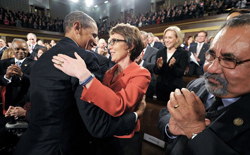Anti-Bullying Laws Top the List of Political Stories
The Outlook concludes the school year with a continuation of the top 10 political stories of the school year. In this issue are the top five.
5. Gabrielle Giffords Returns to Congress
 During President Obama’s 2012 State of the Union speech, Arizona congresswoman, Gabrielle Giffords returned to Congress. On January 8, 2011, Giffords was shot by an assassin during a “Meet your Congressman” event in Tucson. Giffords was shot in the back of the head and was placed in critical condition. Giffords has since made great strides in recovery but it is far from over. During the State of the Union she handed in her letter of resignation to a cheering Congressional chamber.
During President Obama’s 2012 State of the Union speech, Arizona congresswoman, Gabrielle Giffords returned to Congress. On January 8, 2011, Giffords was shot by an assassin during a “Meet your Congressman” event in Tucson. Giffords was shot in the back of the head and was placed in critical condition. Giffords has since made great strides in recovery but it is far from over. During the State of the Union she handed in her letter of resignation to a cheering Congressional chamber.
In the time following the shooting, Republicans and Democrats put aside differences and became Americans. At the time of the shooting, the groups were split on how to fix the debt ceiling. President Obama made a speech in Tucson in the days following the shooting. “As we discuss these issues, let each of us do so with a good dose of humility. Rather than pointing fingers or assigning blame, let us use this occasion to expand our moral imaginations, to listen to each other more carefully, to sharpen our instincts for empathy and remind ourselves of all the ways our hopes and dreams are bound together,” he said.
Dr. Michael Phillips–Anderson, communication professor, is not as convinced. “I don’t think that the Gabby Giffords shooting will have any substantial change to help politicians treat each other. On a human level House and the Senate were certainly happy to see her return, but the story is already largely been forgotten by both the politicians and the media.” He also believes this did not bring the parties together as some other events have. He said, “The only thing that seems to have brought the parties together in recent years is fear of a common enemy following 9/11 and preceding the wars in Afghanistan and Iraq.”
This attempt on Giffords life brought into question about gun safety laws and the right to bare arms. “The Democrats don’t seem to be interested in addressing any serious gun control proposals in the wake of the shooting or other high-profile shootings around the country,” said Phillips-Anderson. Dr. Christopher DeRosa, professor of history, echoed a similar view. “It was another example of how throughout our history the Second Amendment has functioned to undermine democracy, rather than protect it. Second Amendment supporters argue that Americans need free access to fire arms so they can preserve their political freedom from a potentially tyrannical government. It’s never actually served that function.”
DeRosa would even say that by not limiting the right to bare arms, it is hurting our democracy. “What the Second Amendment has been used for in actuality is to deprive the American people of four elected presidents, eight members of Congress (including potential president Robert F. Kennedy), as well as one of the nation’s greatest popular leaders, Martin Luther King. The Second Amendment aided the rebel states in their attempt to evade the outcome of the 1860 election and wage the bloodiest war in U.S. history. And in perhaps the most pernicious example, the Second Amendment enabled white supremacists in the south to deprive black citizens of their political rights and freedoms and maintain racist one-party rule there for a century after the Civil War.”
Giffords return to Congress shows the enduring American spirit. Her fight to survive has inspired many Americans. That day in Arizona changed her life but has brought up two debates: How is bi-partisanship best reached and is regulating gun safety necessary?
4. Health Care Law
The Patient Protection and Affordable Care Act, better known as “Obamacare,” is the new health care reform act that was passed last year in Congress and signed by President Obama in March 2010. This remained a top story because it has recently been before the Supreme Court to see if it is constitutional.
Opponents of the law say that it is unconstitutional to force a product or service upon the American public. According to the law, if one does not have health insurance, you must become part of “Obamacare” or be fined for not having the service. This bill was created, in theory, to give every American access to health care so that everyone could see a doctor if necessary.
This issue is revelent to college students because according to the United States Census Bureau, a report done in 2009 and 2010, citizens from 18 to 24 have the lowest amount insured. According to the study, over 29,000 citizens in that age bracket do not have health insurance. The 29,000 18 to 24 year olds are a small portion of the total that is uninsured. The Census Bureau reports that, in 2009, over 304,000 Americans did not have health insurance. This number rose in 2010 which shows over 306,000 without insurance. Kathy Maloney of Health Services on campus said previously, “What this means for students is that they will be required to possess health insurance that meets the federal guidelines. As the quality of the insurance programs increases, so does the insurance premiums. That is why for the Monmouth University Student Health Insurance plan the premiums have gone up but so does the quality of the coverage.” Some are critical whether this is even possible, or affordable. William Scarano, political science major, said “Given the current economic situation, it doesn’t seem to me that the country has the resources to maintain the current standard of care if all insurers are mandated to cover everyone who can afford to pay the price of the individual mandate and simply eat the costs for everyone who cannot.”
As the Supreme Court makes their decision, this decision becomes very important to students and those who will be entering the work force. Some jobs do not come with health insurance and will force employees to seek private insurance. When young, this is much simpler. “Although our students are young and generally healthy, there will come a time when we all need some kind of medical care and I fear that when that time comes, it may not be as easily available as proponents of this legislation have painted it to be,” said Scarano.
3. Governor Christie Veto’s the Same-Sex Marriage Bill
Whenever a bill is vetoed, there is always going to be opposition voiced by those who were in favor of the motion. When Christie dispelled the same-sex marriage bill, it was no surprise that there was a giant wave of angry outcries over the matter. According to an article in the New York Times on February 17, 2012, the veto was conditional, in which the governor had asked the State Legislature to amend the bill and not grant samesex marriages. Instead it would put into place an overseer that would handle complaints that gay and lesbian couples might have that the states five-year-old civil union law didn’t particularly solve.
To some, though, this compromise isn’t good enough. Freshman Raquel Warehime, a communication major, denounces Christie’s decision to decline the bill. “I think it’s honestly ridiculous that he vetoed the bill. He has no right to say that homosexual people cannot get married. If everyone else was in agreement to legalize it, why did he have to be the person to say no? What harm are same sex marriages doing to society or to the people around them? All they want is legal documentation to say that they are together forever and I see no wrong in that,” states Warehime.
Professor Alan Foster, a sociology adjunct at the University, believes that he might know Christie’s intentions behind the temperamental decision. “He obviously made his decision for political reasons. He has the mistaken idea that someone will want him as a Vice-Presidential candidate, but it won’t happen in this year, nor in 2016 either,” Foster contends. He then goes on to mention that this veto will undoubtedly affect us “until a popular vote on the issue actually takes place, at which time I predict the Gov. will be surprised at the outcome.”
However Brian Martin, a freshman majoring in political science, sees the issue more so as a form of democracy instead of just a heated battle about gay rights. “Christie did it so he could leave the decision up to the people of New Jersey and I am very happy he did that. Democracy is the way to go for such a controversial issue,” says Martin.
No matter one’s stance on the topic of same-sex marriage, it can clearly be said that this battle of rights is still up for debate and will continue in the following months to come.
2. Occupy Wall Street
“We are the 99 percent” definitely has a catchy ring to it. The great gathering of protesters nationwide without a doubt holds a certain type of joinability and their cause seems noble, to say the least. Perhaps these are the reasons that many had flocked to join the legions of Occupy Wall Street protesters in the first place. However, the once-inspiring motion set forth by this group soon turned into pure chaos as fights broke out amongst the inner circles of the group, rapes occurred in the temporary camps set up, and even acts of violence and vandalism were committed to the surrounding areas that the groups seemed to be inhabiting at the time. All these harmful factors have given the group a negative status in news reports, workplaces, and even in daily household names.
Yuri Holsart, a sophomore communication major, believes that the group had started out noble, but due to an unorganized inner working and lack of social development, slowly deteriorated and turned to acts of violence to get their points across. “They really lost their focus on their main issue which was fighting social and economic inequality along with greed and corruption. Instead they themselves had become corrupted and acting out in outlandish manners, like dumping feces and urine down subway stairs, isn’t helping accomplish anything. It’s just making everyone think that they are bothersome and shouldn’t be respected or taken seriously,” states Holsart.
The Occupy Wall Street movement is still around today but hasn’t gotten as much mention in the news as of late. It’s unclear as to whether or not they are planning their next move on their fight against inequality or scheming their next violent publicity stunt, but no matter what they have in the works it seems safe to say that we have not heard the last from the “99 percent.”
1. Anti-Bullying Laws
Bullying and cyber bullying have become an issue brought to the forefront. In late 2010 Rutgers student, Tyler  Clementi, committed suicide after his roommate videotaped an intimate encounter with another man. Since this happened, students and educators alike have pushed for action to prevent bullying.
Clementi, committed suicide after his roommate videotaped an intimate encounter with another man. Since this happened, students and educators alike have pushed for action to prevent bullying.
New Jersey governor, Chris Christie, took the first legislative step by backing and eventually signing the “Anti Bullying Bill of Rights.” Alex Appolonia, a sophomore communication major, believes this is a step in the right direction. “It is something that has affected all in the past and will continue to affect us. It should be enforced because it protects the rights of the students and their safety especially that this is an issue, which occurs on campuses of institutions of a higher education in this State.”
Gregory Boredelon, lecturer of law said previously, “These Anti-Bullying codes are meant to further train school officials on recognizing harassment, intimidation and bullying (HIB) under the law and set up an intra- school procedure to receive complaints and determine sanctions once incidents of HIB are found.”
Bullying used to be limited to physical and verbally inflicting pain upon someone else but in the age of technology, it becomes almost impossible to escape it. According to makebeatsnotbeatdowns. org, a nonprofit anti-bullying organization, says that cyber bullying can fit into seven medians. These medians are: Text message bullying, picture/video clip bullying via mobile phone cameras, phone call bullying via mobile phones, e-mail bullying, chat-room bullying, bullying through instant messaging (IM) and bullying via websites. This is a bigger issue than people realize said adjunct political science professor, Nicole Bizzoco. “Bullying has always been an issue, but given the amount of attention the issue has received lately, including by some members of Congress, I think we may see more policies introduced at the state and federal levels to combat the issue more proactively, which will in turn impact us as the citizens charged with adhering to these policies.”
Bullying will continue to be a large story and an even larger problem. New Jersey has done what it can but this isn’t something that will go away overnight. Appolonia suggests, “Our goal here should be to educate ourselves on this law and to take action should we be aware of this going on around us. We all can collectively work towards a lessviolent society one person at a time.” Bizzoco agrees by saying, “While they may help somewhat, I think the real key to mitigating bullying lies first and foremost with parents.”
IMAGE TAKEN from washingtontimes.com
IMAGE TAKEN from safetysign.com

